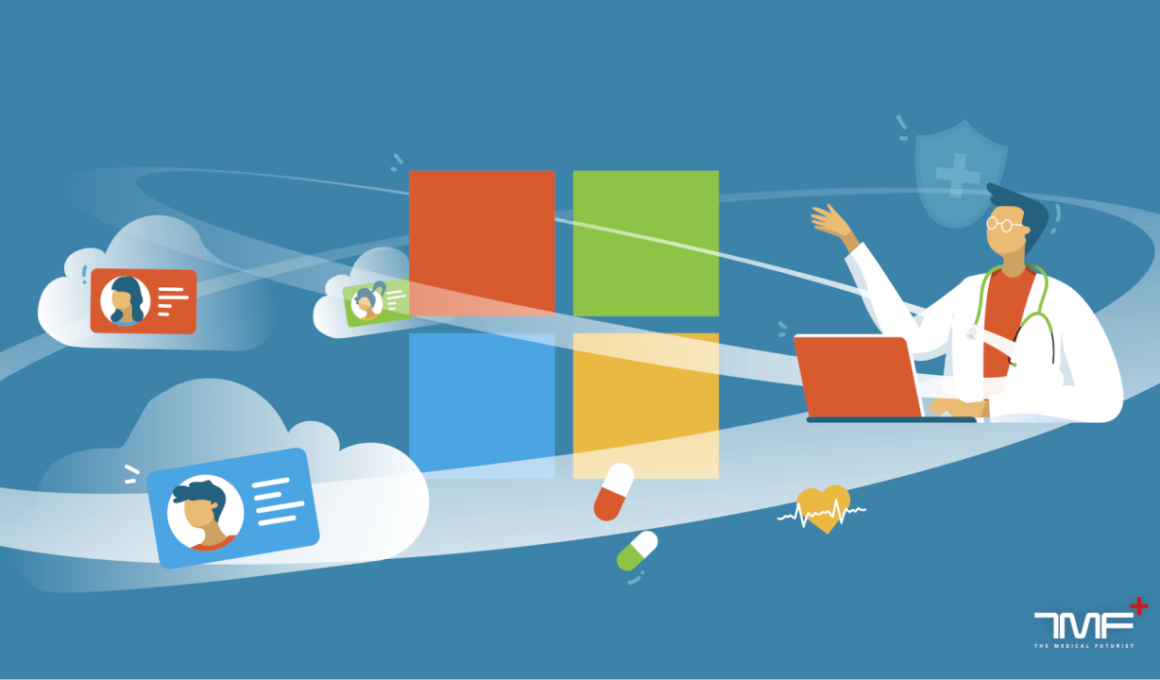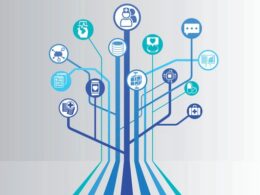Bertalan Meskó, MD, PhD
Director of TMF
August 18, 2021
Citations:
- Gregg Pessin; analyst with Gartner
- Tom McGuinness; corporate VP of global healthcare & life sciences at Microsoft.
- Mary Washington Health System;
- Avtex;
- Diana Kennedy; Bupa’s chief technology and architecture officer.
- Bupa;
- Nuance;
- Satya Nadella; CEO of Microsoft
- Microsoft
For long, Microsoft and Apple have fiercely battled it out in the home computer space. And while they are still competitors in that field, their competition has extended to the healthcare field. However, their approach (and success) significantly differ.
Like while Apple was turning its Apple Watch into a point-of-care device, Microsoft seemed more focused on the enterprise side of things rather than the consumer side.
Throughout 2020, the company strengthened its healthcare-related partnerships with healthcare organisations and research institutes.
Its recent moves indicate as much. Gregg Pessin, an analyst with Gartner, speculated at what those moves could mean.
“ You’ve got a lot of companies
that are producing a lot of devices
and hospitals to want that data —
think about an Apple Watch and its competitors, blood pressure cuffs, weight scales, pulse oximeters and glucometers for diabetic patients,”
Gregg Pessin told ZDNet in a recent interview.
“ That data needs to be accessible to the GPs of the world,
and it’s difficult for them to get access to that.
I think that Microsoft is attempting to figure out a way to make that easier. I don’t think they’re quite there yet,
but I think there is a huge opportunity there.”
So we took a look at how Microsoft plans to better organise health data.
In our series peeking into the healthcare developments around tech giants, we already looked at Amazon, Google and Apple. Now it’s time for technology heavyweight-champion, Microsoft.
Healthcare in the cloud
“ Some of the longest-standing challenges are around
- disconnectedness of data,
- the disconnectedness of care teams, and frankly
- disconnectedness of patients to their own care,”
said Tom McGuinness, corporate VP of global healthcare & life sciences at Microsoft.
The connection seems key for the company’s healthcare goals and it has been pushing forward is cloud computing as a solution.
Last October, Microsoft launched Cloud for Healthcare, a new, healthcare-centric cloud.
It integrates the company’s existing services like
- Microsoft Teams,
- Azure IoT and its
- Healthcare Bot.
These tools aim to assist with collaboration among staff and carry out telemedicine consultations.
Leveraging this new cloud service is a collaboration announced in February between Mary Washington Health System and Microsoft partner Avtex.
They are building a solution to digitally and more effectively connect providers with patients with cancelled or postponed elective procedures.
Healthcare provider Bupa also announced its adoption of Microsoft’s cloud services.
More specifically, the provider announced in mid-June that it intends to use Microsoft Azure services to
- better attend to the digital needs of employees
- and customers.
“ Microsoft Azure services will enable Bupa to take a significant leap forward on our digital transformation journey,”
said Diana Kennedy, Bupa’s chief technology and architecture officer. “
- It will help us accelerate the delivery of digital solutions and
- improve services to our customers
- supporting our ambition to become
the most customer-centric healthcare company in the world.”
Microsoft in healthcare: the multi-billion dollar bet on A.I.
One of Microsoft’s biggest moves in healthcare happened in April when the tech giant announced its acquisition of A. I.-powered speech-technology company Nuance.
The deal amounted to $16 billion (excluding debt); making it Microsoft’s second-biggest acquisition ever,
following its $26.2 billion purchase of LinkedIn.
In the clinical setting, Nuance’s software essentially works as a medical scribe.
- It can listen and
- transcribe doctor-patient conversations into organized medical notes.
What sets Nuance’s healthcare solution apart from other voice assistants is that the company developed its A. I. to decipher the intricacies of such clinical conversations.
“ That process of getting the system, the A. I. engine, to understand the medical jargon that’s important and difficult-I think that’s the real gem,”
said Gregg Pessin.
He also added that the deal provides Microsoft with “ an entry point into the healthcare industry,
and a huge customer base already running this stuff.”
Even if Nuance is not exactly a health-focused company, as it powers other products like Apple’s Siri, it generates over 65% of its revenue from the healthcare industry.
In fact, over 300,000 clinicians and 10,000 health care organizations around the world use Nuance’s voice transcription technology.
With the technology under its umbrella, Microsoft can further integrate it with its cloud services for healthcare.
The software behemoth’s CEO, Satya Nadella, even said that with this acquisition they will help provide professionals everywhere to use advanced A. I. solutions for
- better decision-making and
- create more meaningful connections.
Cautiously stepping into healthcare
Despite the notable acquisition of Nuance, Microsoft’s moves in healthcare have been mostly cautious in recent years.
This is because the company likely doesn’t want to repeat past mistakes and be more effective in its healthcare investments.
- Unlike Apple, Microsoft’s wearable plans didn’t really work well and it discontinued the Microsoft band fitness tracker in 2016.
- In 2019, it also pulled the plug on HealthVault; its online personal health record system which was launched in 2007.
- It also pulled out of another project, Healthcare NeXT, in 2017. The latter aimed to accelerate innovation in healthcare through artificial intelligence and cloud computing.
Having learnt from those failed projects, Microsoft seems to be narrowing its focus for the time being on the cloud and connecting healthcare data more efficiently.
In subsequent years, we haven’t heard the tech giant fail big in healthcare; likely thanks to its cautious approach.
But now that Nuance’s A.I. tech is at its disposal, we can expect it to leverage its potentials further in the near future.
Originally published at https://www.linkedin.com.












